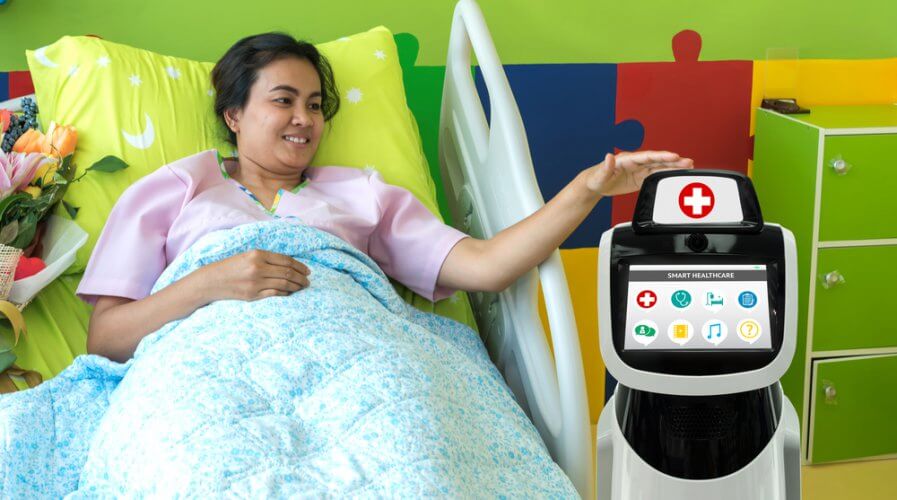
Hospital care in 2030 will be driven by digital altogether. Source: Shutterstock
McKinsey visualizes the evolution of hospital care over the next decade
TECHNOLOGY has started transforming how medical and healthcare industry professionals interact with patients. The changes are slightly disruptive, but think tank McKinsey believes will pave the way to an era of smarter, better hospital care over the next decade.
From artificial intelligence to 5G and internet of things, use cases suggest that new-age technologies can transform workflows in the healthcare space, making operations leaner and smoother, and allowing institutions to focus their energies on providing better experiences.
In the recent past, plenty has been said about how technology can change things now — with leading healthcare institutions such as Geisinger and Kaiser Permanente rolling out cutting-edge solutions and leading by example.
However, if professionals and leaders in the industry really need to get a grip on technology and use it to accelerate their journey to the future, they need to be able to fully understand what modern technology is capable of.
To help them do just that, McKinsey London Senior Partner Penny Dash, Partner Natasha Stern, and Beijing Partner Bo Chen recently created a video where they painted, in vivid detail, the firm’s vision of what hospital care could actually look like in 2030.
“One big change in experience will be that for many things that we go to a hospital for at the moment, we will not go to a hospital. We will instead just do it remotely, or we might go somewhere else that is not the big, huge building in the middle of town,” explained Stern.
According to Dash, patients in the future will also be able to take advantage of video consultations and use adaptors connected to their phones to analyze blood samples and read body temperature and blood pressure.
Those that need to head-in to a clinic to actually see a doctor (human or robotic) in person will be able to schedule an appointment online and avoid waiting in a room full of patients (who might potentially be carrying and transmitting diseases themselves).
Dash pointed out that although patients are currently fascinated by healthcare institutions that are trialing robots for surgeries, there is a good chance that by 2030, robots in operation theatres will be the norm.
“But I think increasingly—and probably by 2030—hands will be seen as illegal instruments. We will think it’s weird to put big, clumsy, often not particularly hygienic fingers inside the human body,” Dash elaborated.
As a result of robots performing surgeries, it is expected that there will be less damage to surrounding tissues, far less invasive surgery, and significantly shorter lengths of stay in the hospital.
Analyzing that scenario, it is obvious that there will be an immediate impact on the number of patients a hospital provides care to at any given point of time as shorter stays in the hospital means people go home sooner, and more efficient surgeries translate to fewer (if any) visits to the hospital post-surgery.
Chen empathizes with patients’ family members who worry about the health of those under the surgeon’s knife. For them, Chen believes technology can provide great solutions, whether they’re seated outside the operation theatre or in another part of the world.
“Virtual reality and some other technologies can help bring family members on-site and vice versa. As your loved ones are experiencing difficult times, you can sort of see them rather than texting them or anxiously waiting outside without knowing what’s going on,” explained Chen.
Finally, given the changes in how healthcare is delivered, Chen suggested that healthcare institutions start preparing for a future where medical professionals are as savvy about technology as they are about the anatomy of the human body.
“As early as in medical school, we should start teaching about digitalization in the hospital space. We should teach about the IT systems and how physicians can play an important part in optimizing the system and optimizing the processes and recognizing the value of technology in medical care.”
Of course — Dash believes that the surgeon in the operating theatre in 2030 might hold a bachelor’s degree in medicine and surgery. Instead, could possess a first degree in robotics and have experience with how robots actually work in healthcare and other industries.
While the McKinsey trio has a strong idea of what the future of hospital care will look like, industry-wide disruption is long overdue. Professionals and patients will be best served if everyone embraces technology as quickly as possible.
READ MORE
- Safer Automation: How Sophic and Firmus Succeeded in Malaysia with MDEC’s Support
- Privilege granted, not gained: Intelligent authorization for enhanced infrastructure productivity
- Low-Code produces the Proof-of-Possibilities
- New Wearables Enable Staff to Work Faster and Safer
- Experts weigh in on Oracle’s departure from adland


